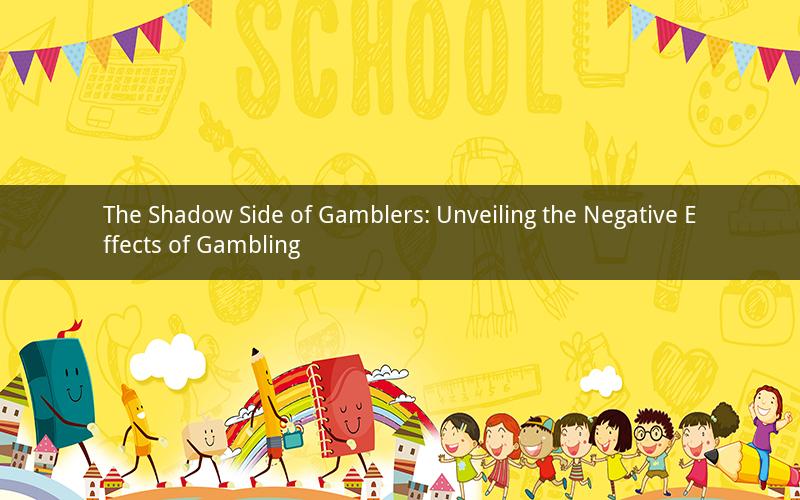
Gambling has long been a source of entertainment and excitement for many. However, there are numerous negative effects of gambling that can overshadow its fun aspect. This article delves into some of the most detrimental impacts of gambling on individuals and society as a whole.
1. Financial Ruin
One of the most common negative effects of gambling is financial ruin. Gamblers often find themselves in debt, unable to repay their loans or support their families. This can lead to numerous other problems, including strained relationships and a decrease in the quality of life. Some individuals even commit crimes to support their gambling habits, further exacerbating the negative consequences.
2. Mental Health Issues
Gambling can also have severe impacts on mental health. Individuals who engage in excessive gambling may experience stress, anxiety, depression, and other psychological disorders. The thrill of winning and the fear of losing can create a cycle of dependency, making it difficult for gamblers to break free from their addiction. In some cases, gambling addiction can even lead to thoughts of self-harm or suicide.
3. Relationship Strain
Gambling can strain relationships with family and friends. When a person becomes consumed by gambling, they may neglect their responsibilities, spend less time with loved ones, and prioritize their addiction over other important aspects of life. This can result in broken relationships, resentment, and feelings of isolation.
4. Crime and Illegal Activities
Gambling can lead to illegal activities, such as fraud, theft, and embezzlement. Individuals who are unable to support their gambling habits may turn to these extreme measures to maintain their lifestyle. This not only causes harm to themselves but also to others who become victims of their actions.
5. Social and Economic Impact
The negative effects of gambling extend beyond the individual to society as a whole. Problem gambling can lead to increased crime rates, strained social services, and economic instability. It can also lead to a decrease in productivity, as individuals may miss work or perform poorly due to their gambling addiction.
Q1: What are the common signs of gambling addiction?
A1: Common signs of gambling addiction include spending excessive amounts of time and money on gambling activities, neglecting responsibilities, lying about gambling habits, and experiencing feelings of guilt, shame, or regret after gambling.
Q2: How can gambling addiction affect a person's mental health?
A2: Gambling addiction can lead to mental health issues such as stress, anxiety, depression, and other psychological disorders. The constant worry about winning or losing, as well as the guilt and shame associated with the addiction, can contribute to these problems.
Q3: What steps can someone take to overcome a gambling addiction?
A3: To overcome a gambling addiction, individuals can seek help from professional therapists, attend support groups, or participate in gambling recovery programs. Setting limits on gambling, seeking financial advice, and developing healthy coping mechanisms can also aid in the recovery process.
Q4: How can society help mitigate the negative effects of gambling?
A4: Society can help mitigate the negative effects of gambling by implementing stricter regulations on gambling establishments, increasing education about the dangers of gambling, and providing support services for those affected by problem gambling. Encouraging responsible gambling and raising awareness about the consequences of excessive gambling can also help prevent addiction and its negative effects.
Q5: Are there any positive aspects of gambling that should be considered?
A5: While there are positive aspects of gambling, such as socialization and the thrill of competition, it's crucial to weigh these against the numerous negative effects. Responsible gambling and awareness of the risks can help individuals enjoy these aspects without falling victim to the more harmful consequences of gambling addiction.